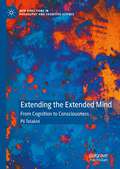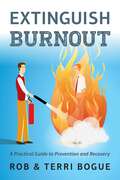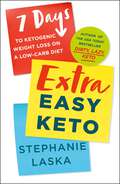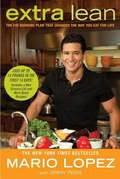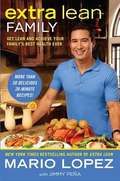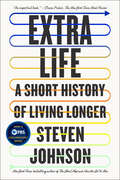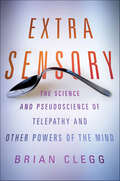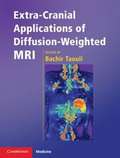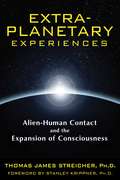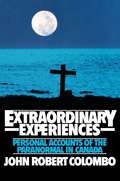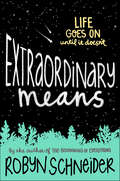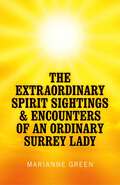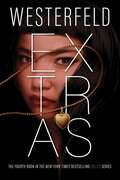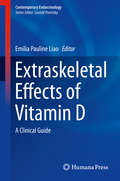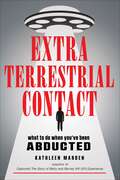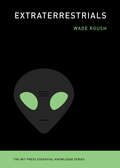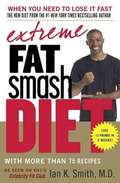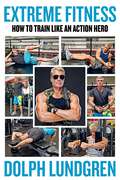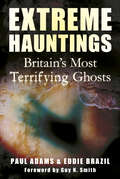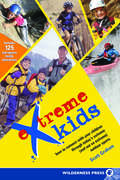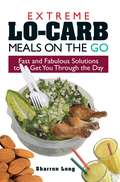- Table View
- List View
Extending the Extended Mind: From Cognition to Consciousness (New Directions in Philosophy and Cognitive Science)
by Pii TelakiviThis book argues that conscious experience is sometimes extended outside the brain and body into certain kinds of environmental interaction and tool use. It shows that if one accepts that cognitive states can extend, one must also accept that consciousness can extend. The proponents of Extended Mind defend the former claim, but usually oppose the latter claim. The most important undertaking of this book is to show that this partition is not possible on pain of inconsistency. Pii Telakivi presents three arguments for the hypothesis of Extended Conscious Mind, examines and answers the most common counterarguments, and introduces a novel means to interpret and apply the concept of constitution. She also addresses the tensions between analytic philosophy of mind and enactivism, and builds a bridge between two different traditions: on the one hand, extended mind, and on the other, enactivism and embodied mind—and maintains that a unifying approach is necessary for a theory about extended consciousness.
Externalism, Self-Knowledge, and Skepticism
by Sanford C. GoldbergWritten by an international team of leading scholars, this collection of thirteen new essays explores the implications of semantic externalism for self-knowledge and skepticism, bringing recent developments in the philosophy of mind, the philosophy of language, and epistemology to bear on the issue. Structured in three parts, the collection looks at self-knowledge, content transparency, and then meta-semantics and the nature of mental content. The chapters examine a wide range of topics in the philosophy of mind and the philosophy of language, including 2D semantics, transparency views of self-knowledge, and theories of linguistic understanding, as well as epistemological debates on contextualism, contrastivism, pragmatic encroachment, anti-luminosity arguments and testimony. The scope of the volume will appeal to graduate students and researchers in epistemology, philosophy of mind, philosophy of language, cognitive science, psychology and linguistics.
Extinguish Burnout: A Practical Guide to Prevention and Recovery
by Terri Bogue Rob BogueBurnout can leave you feeling stuck, exhausted, and powerless but there is a path out. Extinguish Burnout is a clear, compassionate and research-informed guide to understanding what drives burnout and how to overcome it. Authors Rob and Terri Bogue offer readers practical tools and short, actionable chapters that can be easily digested even in moments of overwhelm. From improving self-talk and building resilience to asking for support and setting realistic expectations, this book transforms abstract well-being concepts into daily habits that restore energy and hope.· What causes burnout and how to escape· How to more realistically value the results you're getting· When to ask for and receive more support· What four simple physical self-care activities reduce burnout· How to change your self-talk for the better· What to do to manage your demands so you're not so exhausted· How to better recognize your personal value· How to integrate your self-image and reduce your stress· How to identify and eliminate barriers to your efficacy· How to build resilience against setbacks· Why hope is essential· Why failure isn't final· How to be detached without being disengaged Ideal for anyone feeling worn down by work or life, it provides the insight and encouragement needed to move from surviving to thriving.
Extra Easy Keto: 7 Days to Ketogenic Weight Loss on a Low-Carb Diet
by Stephanie LaskaFrom USA Today and Publisher's Weekly bestselling author Stephanie Laska comes a seven-day keto kick-start that is extra easy to follow! As seen on NBC’s Today show and the cover of Woman’s World magazine, Stephanie Laska shares her secrets to losing 140 pounds. If you want to lose weight on a keto-ish diet while having a life, this is the book for you. There are no complex math equations or “ridonculous” ketogenic rules to follow—think simple and stress-free! Whether you want to start a keto diet fresh or need help getting over a weight-loss hump, Stephanie Laska is here to help you begin in an Extra Easy Keto way.Over seven days, Stephanie will lay out a workable plan in bite-sized pieces. With carb-counting cheat sheets and proven meal-planning tricks, Extra Easy Keto is doable for everyone! You can have your (sugar-free) cake and eat it too. From cheesy casseroles to low-carb cheesecakes, fat-fueled, keto-friendly foods satisfy hunger, facilitate weight loss, and taste great.
Extra Lean
by Mario Lopez Jimmy PenaFacing the reality that a third of the nation's children are overweight, Mario Lopez developed a plan with one simple understanding: what you eat affects those closest to you. As a proud new father, Mario is committed to helping his family start on the right foot when it comes to what they eat by applying the principles of Extra Lean to the household. In Extra Lean Family, Mario shows you how to use rules from his New York Times bestseller Extra Lean to broaden the spectrum of foods your family eats and maintain your best health by cooking nourishing, quick, and delicious meals. Take charge of your food, control the quality and preparation of your meals, and consistently achieve lean results with: Simple, delicious recipes that can be prepared in 20 minutes or less Double-duty options, offering two quick meal variations with the same ingredients Metabolism boosting and nutritious snacks to combat hunger between meals Weekly grocery lists and easy tips for efficient meal preparation Practical steps to control your metabolism and maintain target weight Extra Lean Family is full of delectable, healthy recipes that can be served for quick meals the entire household will love.
Extra Lean Family
by Jimmy Peña Mario LopezFacing the reality that a third of the nation's children are overweight, Mario Lopez developed a plan with one simple understanding: what you eat affects those closest to you. As a proud new father, Mario is committed to helping his family start on the right foot when it comes to what they eat by applying the principles of Extra Lean to the household. In Extra Lean Family, Mario shows you how to use rules from his New York Times bestseller Extra Lean to broaden the spectrum of foods your family eats and maintain your best health by cooking nourishing, quick, and delicious meals. Take charge of your food, control the quality and preparation of your meals, and consistently achieve lean results with: Simple, delicious recipes that can be prepared in 20 minutes or less Double-duty options, offering two quick meal variations with the same ingredients Metabolism boosting and nutritious snacks to combat hunger between meals Weekly grocery lists and easy tips for efficient meal preparation Practical steps to control your metabolism and maintain target weight Extra Lean Family is full of delectable, healthy recipes that can be served for quick meals the entire household will love.
Extra Life (Young Readers Adaptation): The Astonishing Story of How We Doubled Our Lifespan
by Steven JohnsonA young readers adaptation of Steven Johnson's Extra Life, the story of how humans have doubled our lifespan in less than a century—and what to do with the extra life we now have.Humans live longer now than they ever have in their more than three hundred thousand years of existence on earth. And most (if not all) of the advances that have permitted the human lifespan to double have happened in living memory. Extra Life looks at vaccines, seat belts, pesticides, and more, and how each of our scientific advancements have prolonged human life. This book is a deep dive into the sciences--perfect for younger readers who enjoy modern history as well as scientific advances.
Extra Life: A Short History of Living Longer
by Steven JohnsonAs featured in The New York Times Magazine, and on an upcoming PBS documentary series: the surprising and important story of how humans gained what amounts to an extra life, from the bestselling author of How We Got to Now and Where Good Ideas Come From As a species we have doubled our life expectancy in just one hundred years. All the advances of modern life—the medical breakthroughs, the public health institutions, the rising standards of living—have given us each about twenty thousand extra days on average. There are few measures of human progress more astonishing than our increased longevity. This book is Steven Johnson&’s attempt to understand where that progress came from. How many of those extra twenty thousand days came from vaccines, or the decrease in famines, or seatbelts? What are the forces that now keep us alive longer? Behind each breakthrough lies an inspiring story of cooperative innovation, of brilliant thinkers bolstered by strong systems of public support and collaborative networks. But it is not enough simply to remind ourselves that progress is possible. How do we avoid decreases in life expectancy as our public health systems face unprecedented challenges? What current technologies or interventions that could reduce the impact of future crises are we somehow ignoring? A study in how meaningful change happens in society, Extra Life is an ode to the enduring power of common goals and public resources. The most fundamental progress we have experienced over the past few centuries has not come from big corporations or start-ups. It has come, instead, from activists struggling for reform; from university-based and publicly funded scientists sharing their findings open-source-style; and from nonprofit agencies spreading new innovations around the world.
Extra Sensory: The Science and Pseudoscience of Telepathy and Other Powers of the Mind
by Brian CleggExtra Sensory is a pop-science look at the untapped abilities of human beings, from ESP to Telekenesis and other real life sciences that are currently being studied today, from physicist Brian Clegg. We'd all love to have 'psi' abilities like telepathy, telekinesis, and remote viewing. But is there any solid evidence to back up these talents, or are they nothing more than fantasy? We still only understand a small percentage of the capabilities of the human brain—and we shouldn't dismiss such potential powers out of hand. Although there is no doubt that many who claim these abilities are frauds, and no one has yet won James Randi's $1M prize for demonstrating ESP under lab conditions, we still have a Nobel prize winner suggesting a mechanism for telepathy, serious scientists researching the field and university projects that produced potentially explosive results. What's the verdict? By looking at possible physical mechanisms for ESP and taking in the best scientific evidence, the reader can discover if this is all wishful thinking and deception, or a fascinating reality. The truth is out there.
Extra-Cranial Applications of Diffusion-Weighted MRI
by Bachir TaouliContinuous improvement in MRI technology in recent years has led to the application of diffusion-weighted MR imaging in organ systems outside the brain. Extra-Cranial Applications of Diffusion-Weighted MRI provides an extensive review of current and future applications of this imaging modality by world-renowned experts. Organized by organ system, each chapter is highly illustrated, offering a balance of protocols, illustrations and principles of image interpretation. An initial chapter provides an overview of relevant physics and other technical details, followed by detailed chapters on all major body systems including liver, kidney, prostate, breast and spine. A final chapter discusses assessment of therapy response. Written and edited by leading DW-MRI experts worldwide, Extra-Cranial Applications of Diffusion-Weighted MRI is an invaluable resource for radiology trainees, practising radiologists and for researchers in a wide variety of disciplines.
Extra-Planetary Experiences: Alien-Human Contact and the Expansion of Consciousness
by Stanley Krippner Thomas James StreicherDeep insights into human consciousness revealed by accounts of travel to other planets, moons, and stars • Includes interviews with 7 people who have had extra-planetary experiences, including astronaut Edgar Mitchell, Norma Milanovich, and Ingo Swann • Reveals the positive effects of these events on the interviewees’ lives, from cosmic consciousness and loss of fear of death to enhanced spiritual insights • Contextualizes these accounts with 19th- and 20th-century reports as well as alien-human encounters in ancient Sumerian, Vedic, Egyptian, Tibetan, and biblical records Since prehistoric times all cultures report encounters with strange beings and crafts from the sky as well as stories of extra-planetary experiences--that is, travel to other planets, moons, and stars. In the case of modern accounts, these benevolent alien-human interactions bear striking resemblance to one another, even among people with no knowledge of other alien-human claims. And all experiences marked a spiritual turning point in the person’s life, providing a loss of the fear of death, enhanced spiritual insights, a connection to cosmic consciousness, or increased motivation to be of service to humanity. Exploring fresh dimensions of ET contact and extra-planetary experience (XPE) using Harvard professor and researcher John Mack’s witnessing approach to paranormal incidents, Thomas Streicher interviews 7 renowned people who have experienced XPE--including astronaut Edgar Mitchell, Norma Milanovich, and Stanford-tested remote viewer Ingo Swann--and shares the positive spiritual effects of XPE on their lives. Placing their experiences in the context of historical accounts of alien-human encounters from ancient Sumerian, Vedic, Egyptian, Tibetan, Hopi, Dogon, and biblical records as well as 19th- and 20th-century testimonies from Orfeo Angelucci, Billy Meier, Elizabeth Klarer, and others, the author reveals the similarities of these experiences with those of his interviewees. Streicher shows these experiences are not contrived hallucinations but genuine transformative spiritual awakenings akin to near-death and out-of-body experiences.
Extraordinary Beliefs
by Peter LamontSince the early nineteenth century, mesmerists, mediums and psychics have exhibited extraordinary phenomena. These have been demonstrated, reported and disputed by every modern generation. We continue to wonder why people believe in such things, while others wonder why they are dismissed so easily. Extraordinary Beliefs takes a historical approach to an ongoing psychological problem: why do people believe in extraordinary phenomena? It considers the phenomena that have been associated with mesmerism, spiritualism, psychical research and parapsychology. By drawing upon conjuring theory, frame analysis and discourse analysis, it examines how such phenomena have been made convincing in demonstration and report, and then disputed endlessly. It argues that we cannot understand extraordinary beliefs unless we properly consider the events in which people believe, and what people believe about them. And it shows how, in constructing and maintaining particular beliefs about particular phenomena, we have been in the business of constructing ourselves.
Extraordinary Experiences: Personal Accounts of the Paranormal in Canada
by John Robert ColomboWhen did you last have a psychic experience? Are you in the habit of seeing – or sensing – the presence of spirits and ghost? Have you ever spotted a lake monster or sighted a UFO? When did you last consult a fortune-teller, approach a medium work an Ouija board, or read an astrology column? Have you ever had a premonition that some odd event would occur, and then witnessed it actually occurring? Did you ever experience a sense of déjà vu or a moment of pure bliss? Extraordinary Experiences: Personal Accounts of the Paranormal in Canada is a collection of over seventy short yet curiously gripping accounts of experiences and events that may be regarded as abnormal or paranormal. Colombo has collected highly readable accounts of unusual experiences from the past and the present. The supernatural practices of the Indians of the 18th and 19th centuries are described by Samuel Hearne and Paul Kane. From the turn of the century come accounts of "crisis apparitions," poltergeists, and haunted houses, as reported by spiritualists and other observers. But the majority of the personal narratives derive from letters sent to the editor in response to his requests featured in daily newspapers across the country, for first-hand accounts of the supernatural and the paranormal. Over one hundred readers responded; here are some of there responses… Extraordinary Experiences is an extraordinary reading experience. No book quite like it has ever before appeared in Canada.
Extraordinary Means
by Robyn SchneiderJohn Green's The Fault in Our Stars meets Rainbow Rowell's Eleanor & Park in this darkly funny novel from the critically acclaimed author of The Beginning of Everything.Up until his diagnosis, Lane lived a fairly predictable life. But when he finds himself at a tuberculosis sanatorium called Latham House, he discovers an insular world with paradoxical rules, med sensors, and an eccentric yet utterly compelling confidante named Sadie—and life as Lane knows it will never be the same.Robyn Schneider's Extraordinary Means is a heart-wrenching yet ultimately hopeful story about the miracles of first love and second chances.
Extraordinary Spirit Sightings & Encounters of an Ordinary Surrey Lady
by Marianne GreenThe Extraordinary Spirit Sightings & Encounters of an Ordinary Surrey Lady details the personal and incomprehensible eye-witness sightings and encounters from a spiritual dimension that is connected to our earth plane. It is also about our personal energy system in and around us. The book describes the author and her family's psychic background and her development as a professional psychic-medium, reading for many people from all walks of life throughout her life journey. This is a book that will take you into the realms of spirit via the pen of an ordinary Surrey lady.
Extras (Uglies #4)
by Scott WesterfeldThe final installment of Scott Westerfeld&’s New York Times bestselling and award-winning Uglies series—a global phenomenon that started the dystopian trend.A few years after rebel Tally Youngblood takes down the Specials regime, a cultural renaissance sweeps the world. &“Tech-heads&” flaunt their latest gadgets, &“kickers&” spread gossip and trends, and &“surge monkeys&” are hooked on extreme plastic surgery. Popularity rules, and everyone craves fame. Fifteen-year-old Aya Fuse is no exception. But Aya&’s face rank is so low, she&’s a total nobody. An extra. Her only chance at stardom is to kick a wild and unexpected story. Then she stumbles upon a big secret. Aya knows she is on the cusp of celebrity. But the information she is about to disclose will change both her fate…and that of the brave new world.
Extraskeletal Effects of Vitamin D: A Clinical Guide (Contemporary Endocrinology)
by Emilia Pauline LiaoWhile the skeletal effects of vitamin D are well-documented, the role and importance of vitamin D outside of bone health has not been well-established. Vitamin D receptors are located in nearly every tissue of the body, and low levels of vitamin D are associated with a range of various diseases. This book provides an in-depth examination of these extraskeletal effects of vitamin D and the associations between vitamin D deficiency and various disease states. Beginning with a review of the biochemistry and physiology of vitamin D, subsequent chapters investigate its relationship to autoimmune and infectious diseases, various forms of cancer, endocrine issues such as diabetes, obesity and reproductive function, cardiovascular disease and muscle weakness. Concluding chapters discuss the role of vitamin D in neurological disorders, including Alzheimer's Disease, and cognitive function. Focusing on extraskeletal effects only across a range of conditions, Extraskeletal Effects of Vitamin D will be an important resource for clinical endocrinologists and primary care physicians.
Extraterrestrial Contact: What to Do When You've Been Abducted (Mufon Ser.)
by Kathleen MardenThe essential guide for people who have experienced alien contact and for those who love them.It has been twenty years since the publication of How to Defend Yourself Against Alien Abduction by Ann Druffel. This new book by UFO researcher Kathleen Marden is the essential handbook for this generation. This is the fundamental reference and guide for those who have experienced contact with nonhuman intelligent (NHI) entities, families & friends of those “experiencers,” and anyone interested in alien abduction and contact and UFOs.The ten chapters in this book are based on years of research and access to the files of MUFON and the Dr. Edgar Mitchel Foundation for Research into Extraterrestrial and Extraordinary Encounters. Chapters include:Am I an abductee, a contactee, or an experiencer?How to investigate your contact experiencesWhen you discover that it isn’t ET: ghosts and paranormal phenomenaWhen you want it to stop: coping strategies and resistance techniquesWide-ranging, informative, and helpful, this is a book that will find a place as a crucial resource for anyone fascinated by visitations from other worlds.Praise for Extraterrestrial Contact“Finally, there is a (much needed and long awaited) practical handbook for anyone looking for guidance on how to comprehend, evaluate, and digest alien abduction memories into the framework of life in the 21st century. . . . An eye-opening bridge for future generations, as it is predicted humanity will likely inhabit another planet by the end of the next century. If contact is inevitable, perhaps those who have been abducted will one day be honored as our evolutionary ambassadors.” —Jennifer W. Stein, Documentary Producer of Travis: The True Story of Travis Walton“Once again, author and investigator Kathleen Marden has made a remarkable contribution to the world of serious UFO literature. This wealth of practical, well-documented information contained in [Extraterrestrial Contact] will be invaluable to experiencers and abductees as well as to educators, mental health professionals, and to serious students of ufology worldwide.” —Peter Robbins, long-time assistant to pioneer UFO abduction researcher Budd Hopkins, author, and investigative writer
Extraterrestrials (The MIT Press Essential Knowledge Series)
by Wade RoushAre we alone in the universe? If not, where is everybody? An engaging exploration of one of the most important unsolved problems in science. Everything we know about how planets form and how life arises suggests that human civilization on Earth should not be unique. We ought to see abundant evidence of extraterrestrial activity—but we don't. Where is everybody? In this volume in the MIT Press Essential Knowledge series, science and technology writer Wade Roush examines one of the great unsolved problems in science: is there life, intelligent or otherwise, on other planets? This paradox (they're bound to be out there; but where are they?), first formulated by the famed physicist Enrico Fermi, has fueled decades of debate, speculation, and, lately, some actual science. Roush lays out the problem in its historical and modern-day context and summarizes the latest thinking among astronomers and astrobiologists. He describes the long history of speculation about aliens (we've been debating the idea for thousands of years); the emergence of SETI (the Search for Extraterrestrial Intelligence) as a scientific discipline in the 1960s, and scientists' use of radio and optical techniques to scan for signals; and developments in astrobiology (the study of how life might arise in non-Earth like environments) and exoplanet research (the discovery of planets outside our solar system). Finally, he discusses possible solutions to the Fermi Paradox and suggests way to refocus SETI work that might increase the chances of resolving the paradox—and finding extraterrestrials.
Extreme Fat Smash Diet
by Ian K. SmithDr. Ian Smith's Extreme Fat Smash Diet is safe, fast and ultra-effective--taking his proven weight loss system to its hard core. No gimmicks, no denying yourself entire categories of food (like carbs), no nonsense. Instead, Extreme Fat Smash Diet delivers quick, permanent results. On Extreme, you'll set yourself up for: --losing up to 12 pounds the first 3 weeks --learning your dieting profile: are you an alpha, beta or gamma? --choosing one of three cycles of dieting for three different weight loss goals: 5 pounds, 10 pounds, and 15 pounds and up. --real-world exercise ideas -- fresh recipes for quick, tasty meals -- a schedule that allows both meals and snacks -- Dr. Ian's tips and strategies to keep you on track -- a maintenance plan that's designed to stick. If your dieting goal is time-sensitive, Extreme Fat Smash will work for you!
Extreme Fitness: How to Train Like An Action Hero
by Dolph LundgrenAre you ready to take your exercise and fitness routine to the next level? Then take a lesson from internationally renowned action hero Dolph Lundgren. Dolph has created a personal philosophy of fitness based on martial arts, yoga, strength training, biochemical research, professional sports, and over forty starring roles in classic action films. Extreme Fitness: How to Train Like An Action Hero—his autobiographical training guide—features weekly training programs, daily menu planners, guides to equipment and gear, fantastic photos from behind the scenes of Hollywood action movies, and much more! His special tips include: Briefing: The reasons you need to get fit Mission: Personal training and health philosophy Weaponry: How to best combine strength exercise, cardiovascular, and flexibility training Special Ops: Stick to your goals even while away traveling Fuel and supplies: The best foods and supplements Fit forever: Stay in shape for the rest of your life! With detailed exercise plans and over one hundred step-by-step photos, Extreme Fitness: How to Train Like An Action Hero is the kickass guide to building a body that will look great and make you feel even better—forever.
Extreme Hauntings: Britain's Most Terrifying Ghosts
by Paul Adams Eddie BrazilThe most terrifying British ghosts are brought together in this, a unique and original compilation of spine-chilling true encounters both ancient and modern. Not for the faint of heart, this book contains over thirty compelling experiences that reveal a dark and disturbing reality to the realm of the paranormal – deadly curses and murderous ghosts, violent poltergeists, haunted relics and spirit possession – all unsettling insights into a frightening supernatural world. From the mysterious happenings at Hinton Ampner to the eerie Black Monk of Pontefract, the celebrated Enfield Poltergeist and the sinister power of the Hexham Heads, paranormal historian Paul Adams and writer and photographer Eddie Brazil have opened case files spanning over 250 years, from the eighteenth century to the present day, in order to carry out a detailed and chilling examination of the extreme hauntings of Britain.
Extreme Kids
by Scott GrahamWhether you're a longtime outdoorsperson looking to get your kids involved in the activities you loved B.C. (Before Children), or have no outdoor experience but want to enjoy a new sport alongside your children, Extreme Kids will take the whole family on an adventure. Learn the basics of outdoor sports, some extreme (whitewater rafting, kiteboarding, backcountry skiing), and some less so (day hiking, peak bagging, flatwater canoeing), and how to share them with your kids. The book also includes practical and philosophical reasons for family outdoor adventuring. It's never too early to hit the trail (or the river, or the vertical wall) with your kids-each section has an easier version of an extreme sport to get the family's feet wet before diving in.
Extreme Lo-Carb Meals On The Go
by Sharron LongLiving the low-carb lifestyle doesn't have to be difficult. It's all about making smart choices. So how can you still enjoy lunch out with coworkers, stave off the afternoon carb cravings, and find the time to make low-carb meals that taste great? Extreme Lo-Carb Meals to Go offers dozens of tasty meal solutions and low-carb lifestyle tips that will get you through your hectic day.This practical cookbook provides you with answers to all the lifestyle challenges you face every day, including:Are there any smart high-protein breakfast options besides bacon and eggs?Should I eat low-carb energy bars?What's a quick, filling lunch I can bring to work?Is there a way to "snack smart" while low-carb dieting?What easy to prepare low-carb dinner options will the kids actually eat and enjoy?Featuring 150 fantastic make-ahead meals, such as Sausage and Cheese Muffins, Very Veggie Wraps, and Mocha Cheesecake, Extreme Lo-Carb Meals to Go is the perfect way for you to say hello to time - and goodbye to carbs!
Extreme Lo-Carb Meals On The Go: Fast And Fabulous Solutions To Get You Through The Day
by Sharron LongLiving the low-carb lifestyle doesn't have to be difficult. It's all about making smart choices. So how can you still enjoy lunch out with coworkers, stave off the afternoon carb cravings, and find the time to make low-carb meals that taste great? Extreme Lo-Carb Meals to Go offers dozens of tasty meal solutions and low-carb lifestyle tips that will get you through your hectic day.This practical cookbook provides you with answers to all the lifestyle challenges you face every day, including:Are there any smart high-protein breakfast options besides bacon and eggs?Should I eat low-carb energy bars?What's a quick, filling lunch I can bring to work?Is there a way to "snack smart" while low-carb dieting?What easy to prepare low-carb dinner options will the kids actually eat and enjoy?Featuring 150 fantastic make-ahead meals, such as Sausage and Cheese Muffins, Very Veggie Wraps, and Mocha Cheesecake, Extreme Lo-Carb Meals to Go is the perfect way for you to say hello to time - and goodbye to carbs!
